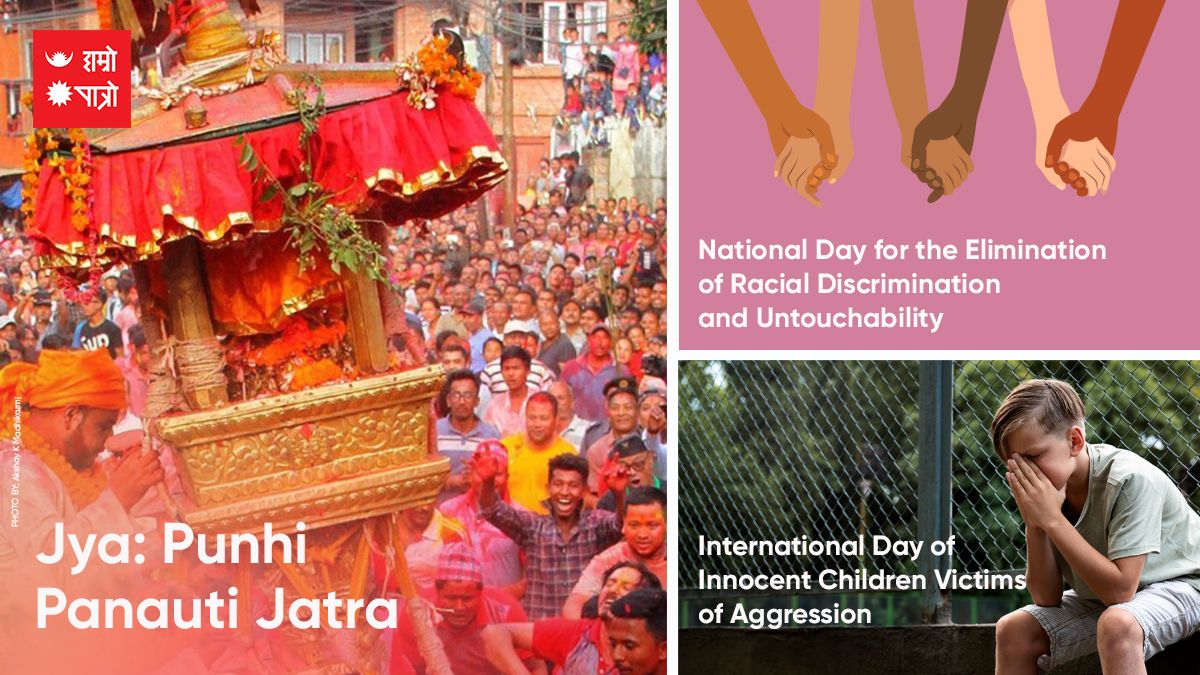
Newa Calender marking Jya Punhi and Panauti jatra
The eighth month of the Newa calendar is Tachala which coincides with the second month of Bikram Samvat. The full moon begins on the 15th day, starting with the new moon. This month is also divided into Shuklapaksha and Chandrapaksha which are called Tachala Thwa and Tachala Ga.
Jya Punhi and its importance in Buddhism
Now let's talk about the day of the full moon which is also called Gaindu Purne. On this day all Hindus and Buddhists celebrate together with joy. For Buddhists, this day is celebrated as Jya Punhi. It is said that Prince Siddhartha left home in search of knowledge on this day. There are some arguments that Buddha left his wife and son at home when he left home and thus disturbed his wife and son by abandoning domestic life and acquiring tragedy but several Buddhist scriptures acknowledge Yashodhara for her contribution and support to Buddha in his knowledge pursuit. In any case, on this full moon, Gautama Buddha gave up his domestic life to gain knowledge. The importance of this full moon is associated with knowledge and sacrifice, so the Newa community celebrates this full moon with joy. The originality of this pilgrimage is connected with the ancient and holy city of Panauti, 30 km southeast of Kathmandu.
The Pauauti city and its ancient importance
As a tributary of the Roshi, Punyamati, and Padmavati rivers, Panauti is a sacred city in Nepal that has been preserving art and cultural heritages for thousands of years. This Jatra is a fest of mating rituals between Lord Unmata Bhairava and Goddesses Bhadrakali. In this rath yatra, the intercourse analogy between Lord Bhairava and Bhadrakali is depicted and indirectly expressed, so it is customary to do some stages of the rath yatra secretly at night. During the rath yatra, the chariots are taken to different places in the city, and water is sprinkled on the chariots.
It takes 9 days to complete the Archana and Jatra versions of Jya Punhi, therefore the arrival and departure of Punhi last for 9 days. Dashami of Shuklapaksha, the Achanju priest offers sacrifices to the Tantric deities. On this auspicious day, the holy bath in the Punyamati Khola and Roshi Khola, also known as Roshimati are of special importance. This ritual is also called the Panauti bath.
We want to tell a little legend about when the river Punyamati was flooded many years ago and the priest had to cross the river to worship Brahmani and Bhadrakali. At the same time, the story of the priest crossing the river with the help of Vasuki Nag is heard throughout the procession.
This year's Jya Punhi or Panauti Punhi or Gaihu Purne, whatever you say, best wishes for this Purne. May the calm, civilized, positive, and inspiring energy always move in our life like the full moon of Shukla paksha.
National Day for the Elimination of Racial Discrimination and Untouchability
National Day for the Elimination of Racial Discrimination and Untouchability
This day has been celebrated since 2068 BS in remembrance of the declaration of Nepal as an untouchability-free nation by the Parliament on 21 Jestha 2063 BS.
What was the Nepali legal system against untouchability before 2063 BS?
Fifty-nine years ago today, in 2020 BS, the then King Mahendra Bir Bikram Shah Dev had brought a law (Muluki Ain) against untouchability and discrimination, although due to the lack of effective implementation of the law, caste discrimination was still practiced.
What is meant by untouchability and discrimination?
Untouchability and discrimination are when a person does or is done based on customs, traditions, religion, culture, customs, origin, caste, caste, descent, community, profession, occupation, or physical condition.
What is the provision of the Constitution of Nepal 2072 against caste discrimination?
Article 24 of the Constitution of Nepal 2072 BS has ensured the right against untouchability and discrimination as a fundamental right. If found untouchable and discriminated against, there is a provision of imprisonment for 3 years or a fine of Rs. 1 thousand to 25 thousand. In addition, the National Dalit Commission has also been recognized as a constitutional body.
It is punishable for any individual, society, government, or group to discriminate against anyone based on caste and to infringe upon their dignity. Let's contemplate this notion as we interact with others.
International Day of Innocent Children Victims of Aggression
Stop attacks on children
It is a sad reality that in situations where armed conflict breaks out, it is the most vulnerable members of societies – namely children, who are most affected by the consequences of war. The six most common violations are recruitment and use of children in war, killing, sexual violence, abduction, attacks on schools and hospitals, and denial of humanitarian access.
On 19 August 1982, at its emergency special session on the question of Palestine, the General Assembly, “appalled at the great number of innocent Palestinian and Lebanese children victims of Israel’s acts of aggression”, decided to commemorate 4 June of each year as the International Day of Innocent Children Victims of Aggression.
The purpose of the day is to acknowledge the pain suffered by children throughout the world who are the victims of physical, mental, and emotional abuse. This day affirms the UN's commitment to protecting the rights of children. Its work is guided by the Convention on the Rights of the Child, the most rapidly and widely ratified international human rights treaty in history.
Stop Attacks on Children is the slogan for this year. The day also reaffirms the United Nations' commitment to protecting children's rights.
Meaningful wishes on this day
Suyog Dhakal
Liked by: